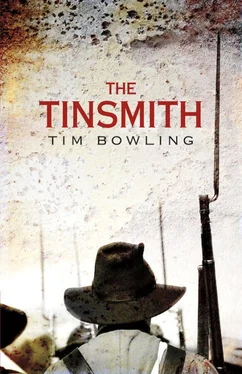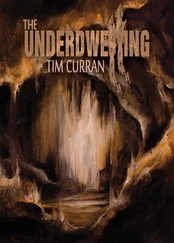Now, with the sloppy mercury of the Gulf of Georgia at his back and the paddlewheeler’s first port of call somewhere in the blurred murk ahead of him, Anson felt the war enter him physically, as it often did. He coughed violently into a handkerchief and clutched the wet railing with his bare hand. A sharp cramp under his ribcage bent him over slightly, and he almost squeezed his glasses, still held in his hand, hard enough to break them. By the time he had recovered, the paddles had stopped turning and the strange chorus of the ordinary world—rainfall, wind, the reel of gull cry, the trill of a songbird—brought him back to the present. Slowly, he positioned his glasses on the bridge of his nose and considered where he’d arrived.
The place had a peculiar name: Chilukthan. But it resembled any other landing the doctor had seen along the coast: several dark pilings and a wharf of lighter-coloured cedar planks, a few square, flat-roofed buildings, an A-roof barn and a house of rough lumber set just behind it, beyond it an earthen dike about fifteen feet high and a hundred yards long. A broad slough, fifty yards wide at the entrance and gleaming dull silver against the muddy flats, ran south from the deepwater channel of the river and disappeared beyond another dark house about a half-mile inland, if you could properly call the swampy morass “land.” Along the slough banks, ranged far apart, a half-dozen giant coniferous trees, their dark green boughs fringed with silver-black raindrops, stood forlorn, each somehow as dominant as the one shattered tree on the battlefield under which he and Dare had first met, before the boy had even become Dare. Anson shut his eyes and willed himself to leave the war in the past, where it belonged. When he opened them again on all the drizzling grey, he saw a rowboat approaching, a thin, dark figure pulling steadily at the oars. Anson shivered—the sight was grim, but at least the figure wasn’t standing upright like Charon, with a long pole in his hands. Suddenly, from over the dike, a strange thunking sound began, harsher and less regular than the sound of the paddlewheeler.
Before Anson could think what the sound might be, a nasal voice made him turn.
“What do you think of the place, doctor? Only a dozen families, give or take a few, a couple of bachelors, but a man has prospects here.”
The speaker—short, thin, rat-faced, but exceedingly dandified under the circumstances (he reeked of hair oil and wore an expensive tailored coat over a bold orange suit)—never ceased to talk of finance. All the way from Victoria across the Gulf of Georgia until at last Anson had retired to the deck, this peacock of a booster had sung the praises of the new province of British Columbia. And why shouldn’t he? According to his own proud song sheet, he was a fiscal agent for an English concern interested in expanding the salmon canning industry.
At first, Anson had welcomed the man’s conversation. After all, William Dare was himself a salmon canner and it would be useful to know something of the challenges he faced. However, over the course of the three-hour journey, it became clear that the agent was obsessed with numbers and hardly interested at all in the practical details of running a cannery; he couldn’t even explain anything about the salmon themselves. Other than mentioning, in a callously offhand way, that Thomas Lansdowne, one of the two brothers who founded this settlement, had lost a daughter of fifteen years to typhoid the summer before, the agent offered little useful information. Besides, he was pompous, and Anson’s tolerance for pomposity had died, along with so many other things, a long time ago.
“I have no prospects in this place,” he answered. Taking another deep breath of the rich musk of mud and brine, he marvelled again at the distance he had travelled from Pennsylvania—by rail to San Francisco, then by steamer to Victoria, and now, at last, by paddlewheeler and skiff to his final destination.
The agent lit a cigar and drew on it in immense self-satisfied pleasure. “Come now, doctor. I’ve met a great many of your countrymen. In fact, British Columbia is as American as it is British, speaking purely from the perspective of business, not culture, you understand.” He exhaled an acrid little cloud, which dissolved his pinched features. “Americans, if you don’t mind my saying so, have great instincts for prospects. That’s what makes your country so successful.”
Anson resented the cigar smoke. The river smell was new, distinct, flavoured perhaps by the great salmon runs he had read about. Tobacco smoke was as common to him as the smell of blood.
“I do mind,” he said below his breath and thought, Did so many die in misery, attempting to tear our country apart or hold it together, only to have this preening, pale-handed Englishman blithely call us all the same? Anson stepped away from the railing, out of the cigar smoke.
The agent chortled, following. “Just you wait, doctor. A man of your education and talents, in a land like this, just ready to boom. Why, in a few weeks, I’ll wager you’ll have your hand in a dozen concerns. I might even be negotiating with you on the price of tinplate. Yes, sir, with your keen interest in the salmon, I’m certain you’ll be pricing tinplate for cans soon enough.”
The skiff reached the side of the paddlewheeler and moved slowly along to the stern. At the deckhand’s request, and with some difficulty, Anson descended the rope ladder into the skiff, the dark figure extending a long, narrow, and surprisingly firm hand to help him. Introducing himself as Henry Lansdowne, the man shook Anson’s hand firmly but did not smile. His face was woe-heavy, much wrinkled, the eyes wet and black and about as sad as any Anson had ever looked into—only the wispy white smoke of side whiskers afforded any colour to the features. Anson understood at once that here was a more typical sort of Englishman, the sort who preferred to keep even his silence to himself.
As the agent struggled to board the skiff, cursing and gasping as his feet sought the next rung of the ladder, the day suddenly erupted in shrieks. Anson turned to face downriver. The whole horizon was blackened with birds winging rapidly over the marsh.
Once landed, the agent’s mercantile bonhomie did not abate; he seemed oblivious to the violent din of the flocks, even though they filled the sky beyond his face and shoulders like a living storm cloud. He merely smoothed his ratty whiskers with his gloved fingers and proceeded to calculate the likely amount of cases in the coming season’s salmon pack.
“I hear rumours of the run being very lucrative, Lansdowne. You’d best keep your Chinese busy at those shears. You can’t have too many cans this summer.” Ah, so that was the sound coming from over the dike, the sound of tin being cut. Anson was about to inquire about particulars, even if it was only a matter of the agent rattling off more prices and statistics, but he didn’t have the chance.
Henry Lansdowne, arranging luggage in the skiff, cut matters short. “It’s my brother, Thomas, you’re here to see. He handles the cannery business.” With that, he lowered himself behind the oars and pulled for the wharf. His expression did not change, but Anson noted the tautness in the jaw and neck muscles. Henry Lansdowne was not a young man—Anson reckoned him ten years senior to himself. Perhaps Lansdowne’s three-score age, combined with the heavy sadness and welcome aura of silence after the agent’s ceaseless chatter, made Anson favourably disposed to the man.
Even though the rain had stopped, the day’s gloom deepened. Unable to push its light through, the little smudge of sun gave up and retreated behind the scudding grey. Other than the creak of the oarlocks, followed by the plash and gurgle of the oars, and every minute or so another punching thunk of the shears, silence descended on the river. Even the rat-faced agent fell quiet; he shrank into the tailored shoulders of his coat and stared at the afternoon’s fresh pall as if it was a personal affront. He blew longer puffs of cigar smoke and tapped a gloved hand on the gunwale.
Читать дальше












